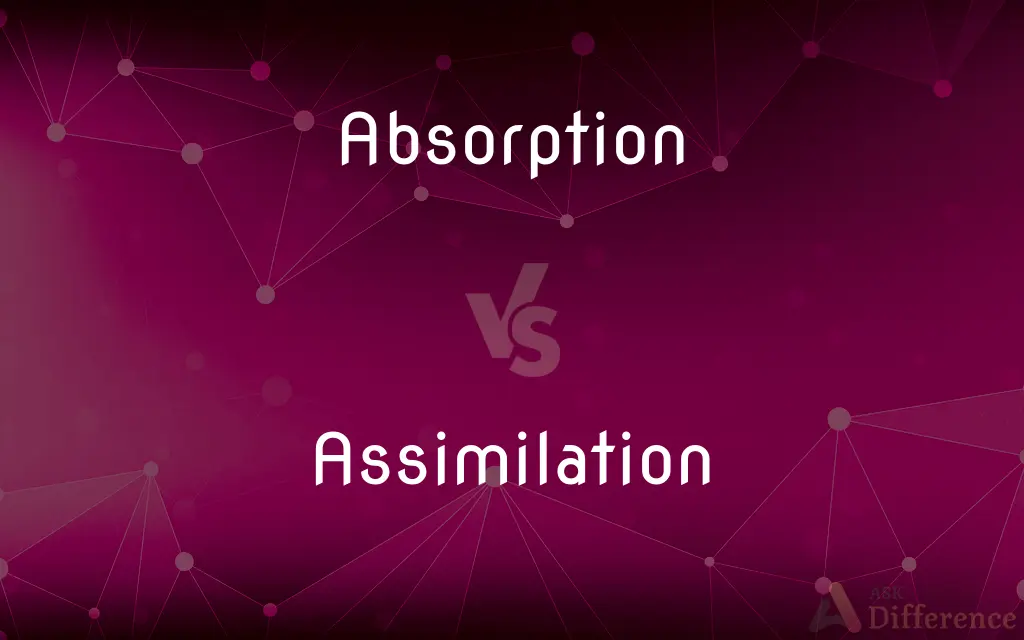Absorption vs. Assimilation — What's the Difference?
Edited by Tayyaba Rehman — By Fiza Rafique — Updated on September 25, 2023
Absorption is the process of taking substances into the body or another material. Assimilation is the process of incorporating absorbed substances into the body's cells and tissues for use.

Difference Between Absorption and Assimilation
Table of Contents
ADVERTISEMENT
Key Differences
Absorption can occur at various points in the body, such as the digestive tract or through the skin. Assimilation primarily takes place within the body's cells and tissues.
Absorption is the initial step in acquiring external substances. Assimilation involves utilizing absorbed substances to support bodily functions.
Absorption can be a rapid or gradual process, depending on the substance and location. Assimilation occurs over time as absorbed substances become integrated into the body.
Absorption results in substances entering the body or another material. Assimilation results in the utilization of absorbed substances by the body's cells and tissues.
Comparison Chart
Meaning
Intake of substances into the body or material
Incorporation of absorbed substances into cells
ADVERTISEMENT
Location
Occurs in various body sites, including skin
Takes place within the body's cells and tissues
Purpose
Initial acquisition of external substances
Utilization of absorbed substances for functions
Duration
Can be rapid or gradual
Occurs over time as substances are integrated
Outcome
Substances enter the body or material
Substances are used by the body's cells and tissues
Compare with Definitions
Absorption
The uptake of substances by a material or organism.
Skin absorption can occur when applying topical medications.
Assimilation
The process of using absorbed substances for bodily functions.
Assimilation of glucose by cells provides energy.
Absorption
The initial step in acquiring external substances.
Absorption of water takes place in the gastrointestinal tract.
Assimilation
The conversion of absorbed molecules into functional components.
Assimilation of lipids in cells supports membrane formation.
Absorption
The process of nutrients entering the bloodstream.
Absorption of nutrients from the small intestine is vital for nourishment.
Assimilation
The incorporation of absorbed nutrients into body tissues.
Assimilation of amino acids into muscles supports growth.
Absorption
The intake of molecules into cells or tissues.
Absorption of oxygen by red blood cells enables respiration.
Assimilation
The integration of nutrients into cellular processes.
Assimilation of vitamins enables metabolic reactions.
Absorption
The act or process of absorbing or the condition of being absorbed.
Assimilation
The process of taking in and fully understanding information or ideas
The assimilation of the knowledge of the Greeks
Absorption
A state of mental concentration.
Assimilation
The absorption and digestion of food or nutrients by the body or any biological system
Nitrate assimilation usually takes place in leaves
Absorption
The act or process of absorbing or of being absorbed as,
Assimilation
The process of becoming similar to something
Watson was ready to work for the assimilation of Scots law to English law where he thought it was justified
Absorption
(obsolete) engulfing; swallowing up, as of bodies or land.
Assimilation
The act or process of assimilating.
Absorption
Assimilation; incorporation.
The absorption of a smaller tribe into a larger
The absorption of bodies in a whirlpool
Assimilation
The state of being assimilated.
Absorption
The imbibing or reception by molecular or chemical action, of radiant energy; the process of being neutrons being absorbed by the nucleus; interception.
The absorption of light, heat, electricity, etc.
Assimilation
(Physiology) The conversion of nutriments into living tissue; constructive metabolism.
Absorption
(meteorology) The process in which incident radiant energy is retained by a substance (such as an air mass) by conversion to some other form of energy (such as heat).
Assimilation
(Linguistics) The process by which a sound is modified so that it becomes similar or identical to an adjacent or nearby sound. For example, the prefix in- becomes im- in impossible by assimilation to the labial p of possible.
Absorption
(physiology) in living organisms, the process by which the materials of growth and nutrition are absorbed and conveyed to the tissues and organs; taking in by various means, such as by osmosis.
Assimilation
The process whereby a minority group gradually adopts the customs and attitudes of the prevailing culture.
Absorption
Entire engrossment or occupation of the mind.
Absorption in some employment
Assimilation
The act of assimilating or the state of being assimilated.
Absorption
Mental assimilation.
Assimilation
The metabolic conversion of nutrients into tissue.
Absorption
(electrical engineering) The retaining of electrical energy for a short time after it has been introduced to the dielectric.
Assimilation
(by extension) The absorption of new ideas into an existing cognitive structure.
Absorption
The act or process of absorbing or sucking in anything, or of being absorbed and made to disappear; as, the absorption of bodies in a whirlpool, the absorption of a smaller tribe into a larger.
Assimilation
(phonology) A sound change process by which the phonetics of a speech segment becomes more like that of another segment in a word (or at a word boundary), so that a change of phoneme occurs.
Absorption
An imbibing or reception by molecular or chemical action; as, the absorption of light, heat, electricity, etc.
Assimilation
The adoption, by a minority group, of the customs and attitudes of the dominant culture.
Absorption
In living organisms, the process by which the materials of growth and nutrition are absorbed and conveyed to the tissues and organs.
Assimilation
The act or process of assimilating or bringing to a resemblance, likeness, or identity; also, the state of being so assimilated; as, the assimilation of one sound to another.
To aspire to an assimilation with God.
The assimilation of gases and vapors.
Absorption
Entire engrossment or occupation of the mind; as, absorption in some employment.
Assimilation
The conversion of nutriment into the fluid or solid substance of the body, by the processes of digestion and absorption, whether in plants or animals.
Not conversing the body, not repairing it by assimilation, but preserving it by ventilation.
Absorption
(chemistry) a process in which one substance permeates another; a fluid permeates or is dissolved by a liquid or solid
Assimilation
The state of being assimilated; people of different backgrounds come to see themselves as part of a larger national family
Absorption
(physics) the process in which incident radiated energy is retained without reflection or transmission on passing through a medium;
The absorption of photons by atoms or molecules
Assimilation
The social process of absorbing one cultural group into harmony with another
Absorption
The social process of absorbing one cultural group into harmony with another
Assimilation
The process of absorbing nutrients into the body after digestion
Absorption
The process of absorbing nutrients into the body after digestion
Assimilation
A linguistic process by which a sound becomes similar to an adjacent sound
Absorption
Complete attention; intense mental effort
Assimilation
The process of assimilating new ideas into an existing cognitive structure
Absorption
The mental state of being preoccupied by something
Assimilation
In the theories of Jean Piaget: the application of a general schema to a particular instance
Absorption
The transfer of substances across a barrier.
Absorption of nutrients through the intestinal wall is a complex process.
Assimilation
The utilization of absorbed materials for growth and repair.
Assimilation of calcium is essential for bone health.
Common Curiosities
Why is the absorption of nutrients from the digestive tract crucial for health?
Absorption in the digestive tract allows the body to acquire essential nutrients like vitamins, minerals, and macronutrients for overall health.
Can you provide an example of absorption through the skin?
Yes, the absorption of sunscreen when applied to the skin is an example of substances entering the body through skin absorption.
How does absorption differ from assimilation in the digestive process?
Absorption is the uptake of nutrients into the body, while assimilation involves using these nutrients within the body's cells and tissues.
Can assimilation occur without prior absorption?
No, assimilation relies on the prior absorption of substances into the body.
Is assimilation an ongoing process within the body?
Yes, assimilation is continuous as absorbed substances are constantly used by cells for energy, growth, and maintenance.
Is absorption limited to nutrients, or can it involve other substances as well?
Absorption can involve various substances, including nutrients, medications, toxins, and chemicals.
How does the duration of absorption compare to assimilation?
Absorption can be relatively rapid, while assimilation is a more gradual and continuous process.
What happens to substances after absorption if assimilation doesn't occur?
If assimilation doesn't occur, absorbed substances may not be utilized effectively by the body and may be excreted.
What role do cells play in the assimilation process?
Cells are central to assimilation as they incorporate absorbed substances into metabolic processes, growth, and repair.
What is the significance of assimilation in the context of nutrient utilization?
Assimilation ensures that nutrients are effectively used by the body for energy production, tissue repair, and other essential functions.
Can assimilation be influenced by dietary choices and overall health?
Yes, a balanced diet and overall health can impact the efficiency of assimilation and nutrient utilization.
Is assimilation solely related to nutrients, or does it apply to other substances too?
Assimilation can apply to various substances, including hormones, medications, and minerals that support bodily functions.
What role does the circulatory system play in both absorption and assimilation?
The circulatory system transports absorbed substances to cells and tissues for assimilation, ensuring their availability for cellular processes.
How does the body prioritize the assimilation of nutrients for various functions?
The body prioritizes assimilation based on immediate needs, with nutrients allocated for energy, growth, and repair.
What are some factors that affect absorption in the digestive tract?
Factors include the presence of enzymes, the health of the gastrointestinal lining, and the solubility of substances.
Share Your Discovery

Previous Comparison
Feeling vs. Idea
Next Comparison
Exceptional vs. ExtraordinaryAuthor Spotlight
Written by
Fiza RafiqueFiza Rafique is a skilled content writer at AskDifference.com, where she meticulously refines and enhances written pieces. Drawing from her vast editorial expertise, Fiza ensures clarity, accuracy, and precision in every article. Passionate about language, she continually seeks to elevate the quality of content for readers worldwide.
Edited by
Tayyaba RehmanTayyaba Rehman is a distinguished writer, currently serving as a primary contributor to askdifference.com. As a researcher in semantics and etymology, Tayyaba's passion for the complexity of languages and their distinctions has found a perfect home on the platform. Tayyaba delves into the intricacies of language, distinguishing between commonly confused words and phrases, thereby providing clarity for readers worldwide.
















































